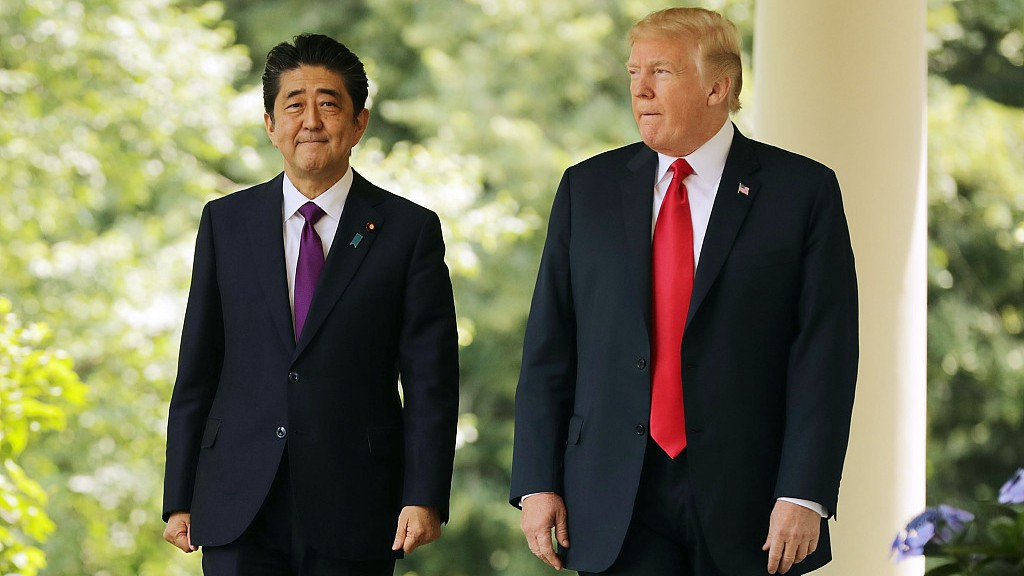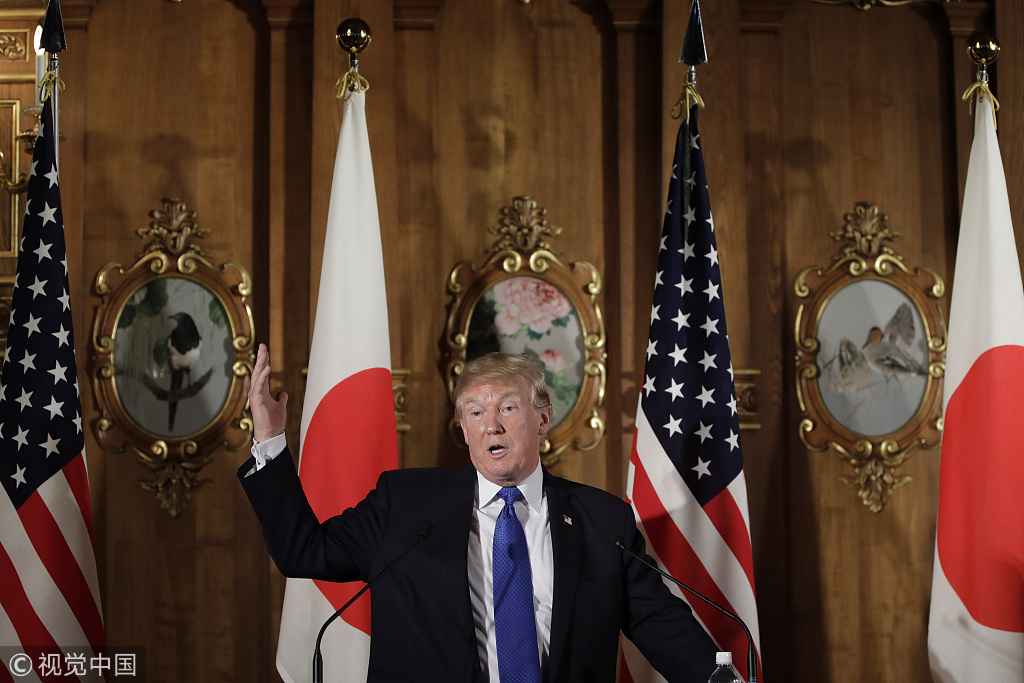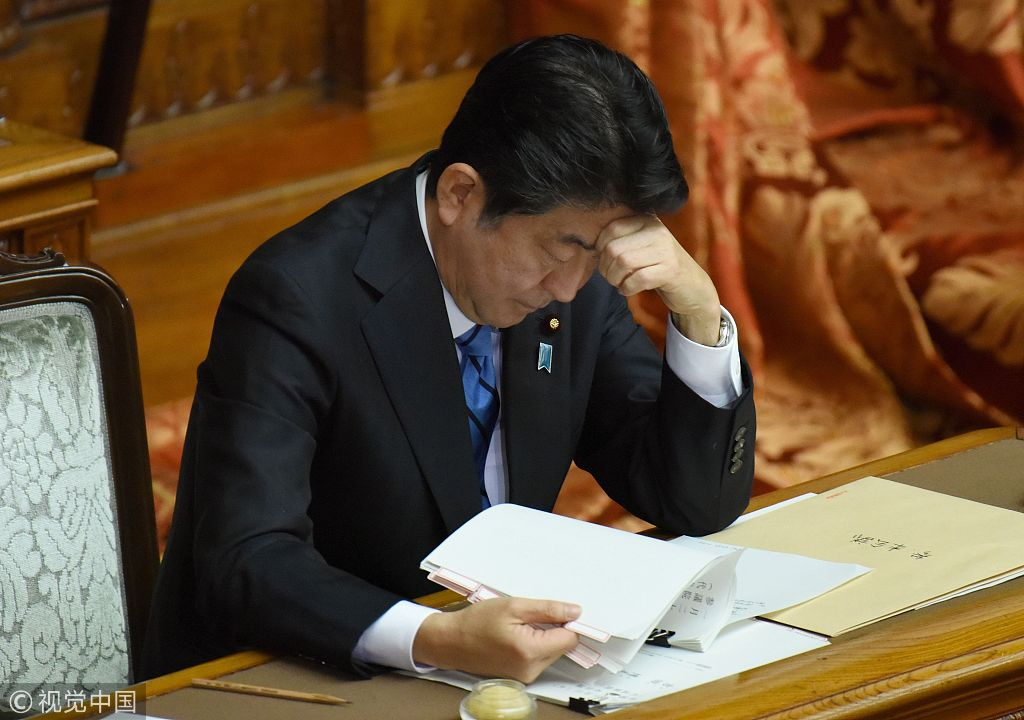
Opinion
14:09, 21-Jan-2019
Opinion: TAG harms Japan's will for free trade
Zhou Mi

Editor's note: Zhou Mi is a senior research fellow at the Chinese Academy of International Trade and Economic Cooperation. The article reflects the author's opinions, and not necessarily the views of CGTN.
Japan is important to the U.S. when it comes to trade. Even when former U.S. president Barack Obama promoted the negotiation of Trans-Pacific Partnership (TPP), the agreement with 12 negotiating countries was somehow regarded as a bilateral Free Trade Agreement (FTA) between the U.S. and Japan plus 10 other countries. Also, during his first visit to the Asian-Pacific region in November 2017, President Donald Trump explicitly complained that the unfairness and non-opening of the Japanese market had harmed the U.S. for a long time. To him, the imbalance needs to be resolved with the utmost priority.
At the beginning of 2019, the U.S. and Japan started the negotiation of Trade Agreement on Goods (TAG) as programmed, reflecting mostly bilateral adjustments. But, what can't be ignored is that these talks will have much more spillover effects beyond the range of these two countries.
As the joint statement highlighted during Prime Minister Shinzo Abe's visit to the U.S. in September 2018, the combined economies of the U.S. and Japan represent approximately 30 percent of global GDP while the TAG would change the structure and direction of trade between these two countries.
From this statement, there are obviously different positions. The U.S. is more aggressive to require more commitments from Japan in the motor vehicle sector while Japan is defensive to express that it has constituted the maximum level of market access on the agricultural, forestry and fishery industries. What's more is the expression of Japan for the expectation of TAG-free, fair and rules-based and Trump wants to have reciprocal trade as well as reducing the trade deficit.

U.S. President Donald Trump gestures as he speaks during a news conference at Akasaka Palace in Tokyo, November 6, 2017. /VCG Photo
U.S. President Donald Trump gestures as he speaks during a news conference at Akasaka Palace in Tokyo, November 6, 2017. /VCG Photo
When these guidelines are actually acted on by the U.S. trade representatives, the demands from the U.S. have significantly widened. Requirements for eliminating discriminatory practices, tariffs, technical barriers or geographical indicators on agricultural industries are also raised by the U.S. side. These requirements will give Japan some greater pressures than the time Japan spent negotiating TPP.
If everything goes well as the U.S. wishes, the TAG would at least have two main impacts on the rest of the world, and more effects on the political level than at the economic level.
The first will be the trade and investment transfer and creation effect. The integration of the markets will usually improve the efficiency of economies and create new demands. As an industrialized country, Japan has enterprises with competitiveness in some sectors and areas. But as the problems with its aging society are getting quite serious, producing or processing in the country is getting less and less attractive.

Japan's Prime Minister Shinzo Abe listens to questions at his seat during a plenary session of the upper house of parliament in Tokyo, January 24, 2017, after U.S. President Donald Trump decided to pull the U.S. out of the TPP. /VCG Photo
Japan's Prime Minister Shinzo Abe listens to questions at his seat during a plenary session of the upper house of parliament in Tokyo, January 24, 2017, after U.S. President Donald Trump decided to pull the U.S. out of the TPP. /VCG Photo
If the market has to be opened to the same level as the U.S., there will be more business activities accumulated in the U.S. than in Japan to meet the markets of these two countries. Investment inflows may be observed in the U.S. to access the Japanese market. Since the U.S. has much stronger competitiveness in land and mineral, capital and even human resources, Japan may suffer a lot from most sectors of business, while agriculture would be one of those badly affected. The practice of TAG may give the U.S. more power and confidence when they negotiate with other partners like the EU in the future.
Second, the U.S. is trying to regulate Japan and the rest of the world by exporting its value and criteria. Due to a lot of reasons, different countries may have quite different but effective ways of governance. However, the agreement may challenge that. Japan is required to act side-by-side with the U.S. in the issues of so-called nonmarket-oriented policies and practices by third countries, intellectual property theft, forced technology transfer, trade-distorting industrial subsidies, distortions created by state-owned enterprises and overcapacity.
Under the agreement, Japan will cooperate with the U.S. in governance issues which have adverse effects and are against Japan's attitude toward globalization and promoting free trade in the world.
(If you want to contribute and have specific expertise, please contact us at opinions@cgtn.com.)

SITEMAP
Copyright © 2018 CGTN. Beijing ICP prepared NO.16065310-3
Copyright © 2018 CGTN. Beijing ICP prepared NO.16065310-3